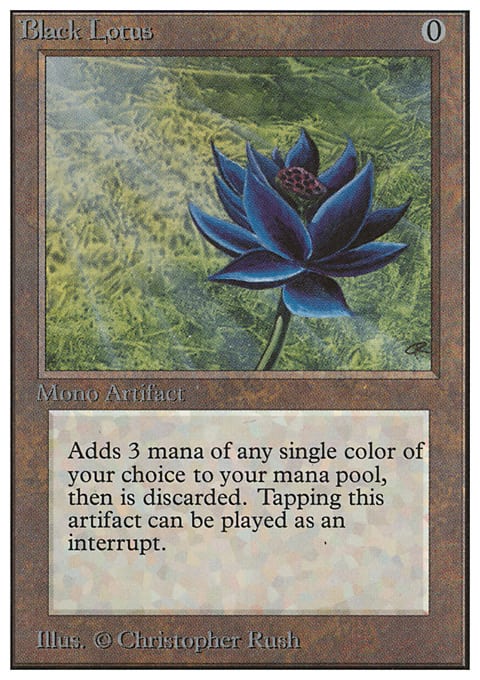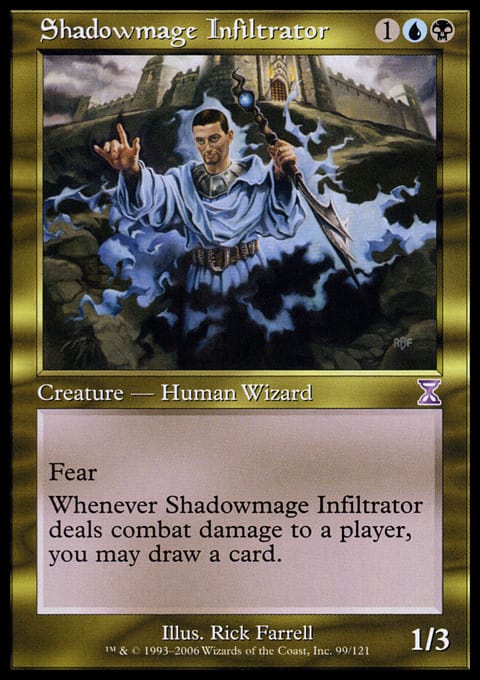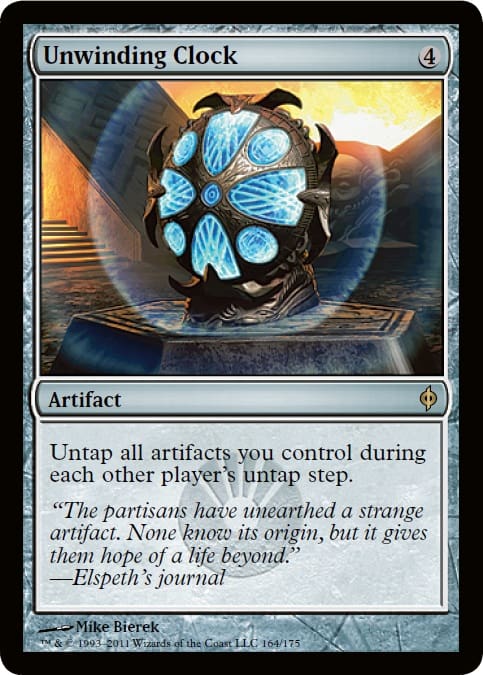I’ve come to realize that there are people who have been playing Magic competitively for years primarily online and who view Magic mainly as an online game. I guess I shouldn’t be surprised given that since Magic was first released in 1993 and Magic Online went live in 2002, it has now been available online longer than it was available in paper but not online. To me, Magic Online is still that new thing all the kids are doing. I guess I’m getting old . . . Get off my lawn, you kids!
The wizards at . . . well, Wizards . . . have done a great job of recreating the Magic experience digitally, but it’s impossible to make the two experiences exact duplicates. In many ways, the paper version is just superior, and in some ways, Magic Online is better. There, I said it—happy? For people who only play Magic Online or only play it live, these differences and advantages are generally moot points—they might as well be two entirely different games. For players who play both, the differences are important. If you only play one, you should be playing both, and I’m going to tell you why.
I started playing Magic in 1994, shortly after it was first released in 1993. I had a Nintendo gaming system back in high school, but Magic scratched several itches that I had never been able to scratch with video games. First was the collecting of physical objects. I had spent years collecting comic books, and Magic was something else that I could collect, organize, and even resell, sometimes for a decent profit. Unlike comic books, these were objects I could use to do something over and over. While I enjoyed reading comics, once I finished reading one, it was put into a plastic sleeve (I should have guessed that one day I’d be putting Magic cards into plastic sleeves), filed away, and left untouched.
Not only did I make use of my little investments over and over, but I found out I could use them to make me money while they remained in my possession. I won the first thousand-dollar-first-prize tournament I entered after buying my first Black Lotus and adding it to my deck. Woohoo! Suck it, Mario and Luigi!
Since Magic was initially just a live, in-person game, having high-quality opponents and teammates close to you was a major factor in a player’s development. It’s no coincidence that Jon Finkel, Rob Dougherty, Dave Humpherys, and I all were inducted into the Pro Tour Hall of Fame within the first two ballots. Back in the 90s, we played with and against each other on a regular basis, which greatly helped to elevate each other’s gameplay. The most successful players from that era often came from urban centers were there were high densities of players, events, and places to play and acquire cards.
When Wizards of the Coast announced the first team Pro Tour, I thought that it was tailor-made for Dave, Rob, and me. Not only were we individually among the more successful players on the Tour, but we all lived in the same city and already played together on a regular basis. On our way to winning that event, it was no surprise to run into Jon Finkel in the semi-finals, who was teaming with two close friends who—like Jon—were also from New York City.
The other big factor that helped in the early days was an aptitude for deck design. It was pretty common to arrive at a tournament and have several teams of players playing innovative decks that no one saw coming, even in environments that weren’t brand new. Without the Internet and Magic Online to provide players with a constant stream of tier-one decklists to choose from, you were forced to actually build and test a variety of different possibilities to find a good deck to play. The inspiration-to-perspiration ratio was slanted more toward the inspiration in those days.
With the arrival and subsequent popularity of Magic Online and the use of the Internet in general for the dissemination of Magic information, things have changed greatly. Probably the biggest change has been the leveling of the geographical playing field in Magic. Now you can live anywhere in the world, and as long as you have an Internet connection, a computer with Microsoft Windows, and a credit card, you can play as much Magic as you can stand—and often against pretty strong competition and at all hours of the day and night.
The result of these changes in competitive play has been a desirable one for Wizards, if not for some of the pros who had been dominating the pre-MTGO tournament scene. The level of Magic play skill around the world has risen thanks to constant access to high-quality playtesting. Spending huge chunks of time playtesting was always a key to success, but the role of available time for playtesting has increased. Now, the more hours you’re willing to set aside to play Magic, the better. No more waiting for other players to get out of work, get out of class, wake up, feel like testing, or whatever. If you’re willing to commit twenty-four hours a day to playing Magic, you can. The three main factors needed to win Pro Tours before were: play skill, luck, and deck-design skill. Now they are play skill, luck, and hours devoted to playing Magic Online.
I have played countless hours of MTGO over the last nine years, but there are still some aspects of it that I have trouble getting behind:
- The Clock – Don’t get me wrong; Magic Online needs a clock. That being said, it drives me (and many others) nuts. Some of my worst Hulk moments have been triggered by the clock: Darwin very angry, Darwin smash puny computer! Few things about Magic Online are worse than losing a match in which you have a game in hand and your clock runs out just as you’re frantically clicking through stops as you’re swinging in for the win. I often find it difficult to finish a match in time if it happens to go to three games. If you play me and wonder why I don’t use the chat feature, well, now you know . . . Don’t get me wrong, some people not only like the clock, they prefer it to the live system. Rob Dougherty would prefer to play most of his turns at breakneck speed just as long as once or twice a game he could take as long as he wanted to make a difficult decision, a play style that doesn’t fly on the Pro Tour.
- The Chat – As a game designer, I spend time thinking about things like: Does this game need a chat feature? As an introvert (I prefer this label to unsocial ogre), I’m constantly looking for games that allow you to play with real opponents without need for chatting. (Okay, this might be another reason I don’t use the chat feature in Magic Online . . . ) Seriously, though, does Magic Online really need chat? Sigh—the answer is probably “yes,” but only barely. In live Magic, talking to your opponent is a crucial part of high-level play, what with announcing life total changes and so on, but I’ve played plenty of matches with little trouble against people who didn’t speak English. Do we really need to talk to our opponents online, though? The program takes care of most of the things we normally need to discuss, such as targeting, passing priority, changing life totals, and so on. The saddest part is that most memorable chats on Magic Online are typically messages from unsportsmanlike opponents right after a loss—usually something like, “I can’t believe I lost to such a bad player, you’re so lucky, did your mama teach you to tap mana like that?” and other even less pleasant rants. This rarely seems to happen during live games. What is it about the anonymity of playing online that makes some people into such total jerks?
What might be less obvious is the continued need for playing live. This might be especially hard to understand for players who currently play exclusively online. There are two big reasons that live play is important.
The first of these is only really important if you aspire to playing in big live events such as the Pro Tour. Playing live is a chance for you to develop skills that aren’t relevant online—skills such as reading your opponent, not letting him read you correctly, and learning to use and/or overcome various other types of gamesmanship that don’t come up online.
The second reason is especially important for ogres—um, I mean introverts—like me. Getting and practicing human interaction. Being comfortable spending countless hours in front of a computer screen is an increasingly useful ability in today’s world, but live interaction is still a crucial—if a steadily less-used—skill. Not only is it good to practice basic, in-person, social interaction, but it’s usually easier to form meaningful relationships in person. The vast majority of my close work and personal relationships come directly from Magic, and by Magic, I don’t mean Magic Online.
According to Wikipedia, (thus, it must be true) Wizards claims that Magic Online accounts for somewhere between thirty and fifty percent of the total Magic business. Clearly, Magic Online is here to stay for better or for worse, and we might as well embrace it. I imagine most of you reading this article on your computers don’t need encouragement to play online; just don’t forget to head down to your local store and play some games with real people, too.



























